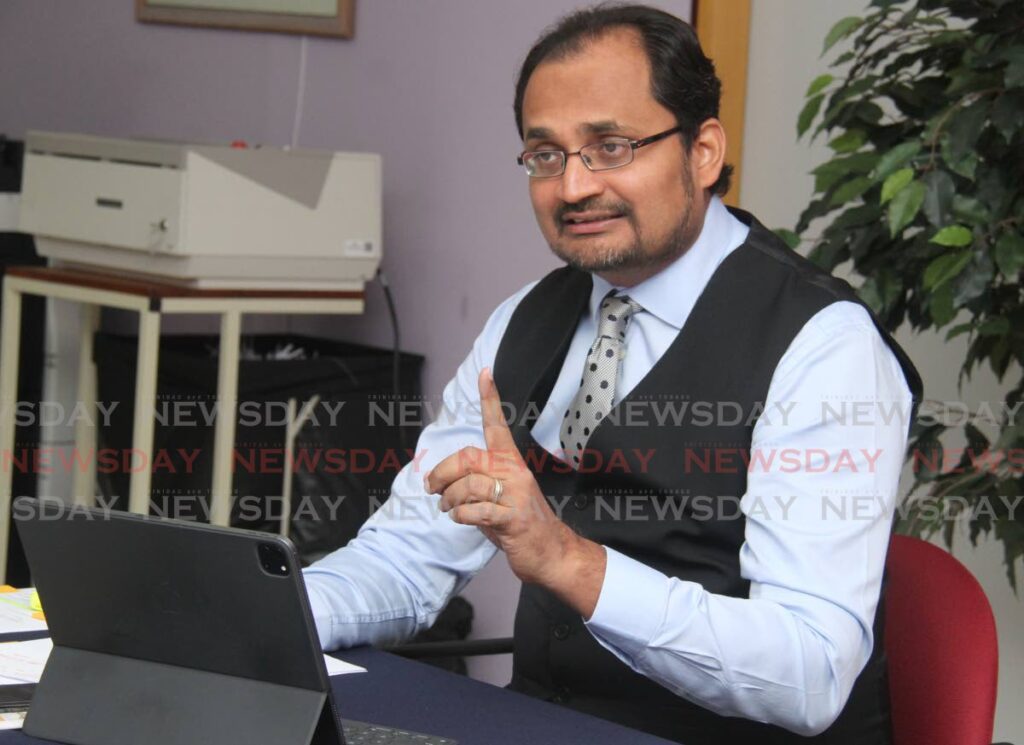Central Bank’s half-truth report

DINESH RAMBALLY
THE CENTRAL Bank’s latest economic bulletin dated January 2024 is woefully inadequate in revealing the entire truth about the state of the economy. The report presented in February contained many instances of outdated data to justify its conclusions. The summary of fiscal operations has data up to October 2023, unlike previous reports which contained more current information.
I have stated before that the Central Bank reports reflect a scenario which is inconsistent with the reality that businesses and citizens are experiencing on the ground. This report is no different.
TT's national debt has been on an upward trajectory. The current total debt outstanding figure, according to the same Central Bank statistics, is $110,865 million (see Central Bank website). This does not take into account the recent bond issue. On closer examination, if you look at the central government’s bond issuances as liquidity-absorption measures you would see a figure of zero. This indicates that the bonds issued are actually to increase the debt stock of the country.
This continuing trend to use VAT bonds to pay refunds has not been recommended by all the experts. The Government has deferred the direct payment of the refunds to manipulate its revenue outcome to the detriment of businesses and investors. The impact has not been considered by the Central Bank in its report. With more than $10 billion owed to businesses for VAT refunds and bonds, it is clearly a recipe for disaster.
So what economic growth is the Central Bank actually speaking about? Where is the data? I stated in my previous release on the Central Bank report of July 2023 that the revenue projections were overstated. This report confirms that the revenue estimate was in fact overstated by almost $1.8 billion. Why the manipulation? With this continuing mismanagement of the economy, I caution the Government on raiding the HSF and increasing the public debt.
Despite the escalating cost of living, salary increases have failed to keep pace, exacerbating income inequality and financial insecurity among the populace. This is leading to many individuals finding themselves trapped in a cycle of poverty, unable to build savings or invest in education and healthcare. The widening gap between earnings and expenses perpetuates social disparities and hampers long-term economic mobility. This further highlights the hidden truth behind the Central Bank’s report.
The inefficacy of state institutions poses a significant barrier to economic progress in TT. Bureaucratic red tape, corruption and bureaucratic inefficiencies stifle entrepreneurship, deter foreign investment, and impede the delivery of essential public services. The National Insurance Board is in dire need of reformation as indicated by several actuarial reports. The Government is inconsistent on the way forward, jeopardising the retirement of the population and calls this responsible government.
The Social Welfare Division is keeping citizens waiting for periods of more than 15 months and counting and still cannot deliver to them their old age pension, and no one is taking any responsibility for the situation.
The Prime Minister recently announced that he will request $100 million from the Minister of Finance to inject into crime hotspots. Once again the cart is being placed before the donkey. What is the objective of spending this $100 million? How will it be spent? Moreover, the societal costs associated with crime, such as increased healthcare expenditures and reduced productivity, further strain public finances and impede economic growth.
With an effective tax rate of nearly 57 per cent, citizens are facing an escalating tax burden as the Government grapples with revenue shortfalls and fiscal pressures. Rising taxes, coupled with stagnant incomes, diminish disposable incomes and diminish consumer spending power.
Additionally, high tax rates discourage entrepreneurship and investment, stifling innovation and hindering economic diversification efforts. How are you going to boost the local economy if citizens do not feel comfortable and do not have the disposable income to make discretionary purchases?
TT's foreign exchange reserves are dwindling amidst a backdrop of declining export revenues and persistent trade imbalances. The current balance is the lowest in many years and continues to decline. The erosion of forex reserves limits the Government's ability to stabilise the local currency and manage external shocks effectively. Furthermore, dependence on volatile commodity markets exposes the economy to external vulnerabilities, exacerbating exchange rate volatility and hindering long-term economic sustainability.
The petrochemical sector is experiencing a steady decline due to factors such as dwindling reserves, ageing infrastructure, and shifting global energy trends. The downturn in the petrochemical industry not only undermines export earnings but also threatens thousands of jobs and hampers efforts to diversify the economy away from reliance on hydrocarbons. Even the Dragon gas field yield is several years away, and possibly uncertain.
Addressing the country's economic fragility requires a comprehensive strategy that tackles structural inefficiencies, fosters innovation and diversification, enhances fiscal discipline, and promotes inclusive growth. It is time the Central Bank paints a true economic picture.
Dinesh Rambally is the MP for Chaguanas West


Comments
"Central Bank’s half-truth report"